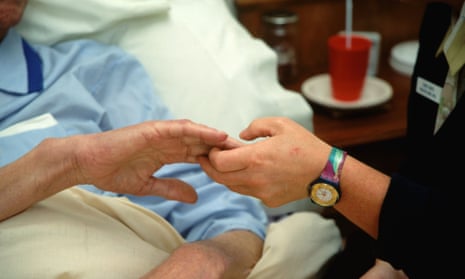Terminally ill welfare claimants are being asked by benefit assessors when precisely they are expected to die, according to evidence seen by Frank Field, the newly elected chairman of the work and pensions select committee.
Field has written to the work and pensions secretary, Iain Duncan Smith, asking for an explanation. He told the Guardian: “There is absolutely no need for this level of intrusive and painful questioning by DWP officials. If I have had two such cases in my constituency in recent weeks; I dread to think how often this is happening around the country.”
The Labour MP for Birkenhead said one of the complaints had come to him from a vicar on behalf of his sister.
The two individuals were claiming for a personal independence payment (PIP) under the “special rules terminally ill” procedure. Both had submitted DS 1500 forms signed by their doctor – forms that need to be signed if the patient is regarded as suffering from a terminal illness.
The DS 1500 asks for factual information and does not require the doctor to give a prognosis. It should contain details of the diagnosis, including whether the patient is aware of their condition and, if unaware, the name and address of the patient’s representative.
It should also set out the current and proposed treatment, and brief details of clinical findings. A doctor is expected to believe that the patient is likely to die within six months, but once the form is submitted the Department for Work and Pensions decision-makers are not expected to challenge a patient about the expected date of of death, or question a patient who is not aware the doctor has declared their illness to be terminal.
The claimant, once found by the doctor to be terminally ill, is not supposed to meet any qualifying period for a claim, and should get the highest rate of claim.
In a letter sent to Duncan Smith on 30 June, Field writes: “My constituents tell me that despite submitting a DS 1500 form drawing attention to a terminal illness, they have been asked directly to their face whether they think they will soon die and by what date they expect to be dead. In one case my constituent’s mother was asked by when she expected her daughter to die and in front of her daughter.”
He continued: “This has left my constituents feeling understandably very upset. They tell me they are appalled by the hardness of the questioning and its intrusiveness.”
Field said he had asked to see the guidance, either national or local, that could have led PIP assessors to think this line of questioning was legitimate. He had also asked for Duncan Smith to review the policy at a national level.
PIP is replacing the disability living allowance, and has been dogged by delays. The standard daily living component of PIP is worth £54 a week.
The DWP said: “Claims from people with a terminal illness are fast-tracked using ‘special rules’, where we pay the highest rate of care immediately without a face-to-face assessment.
“All claims are dealt with fairly, sensitively and compassionately by specially trained staff – they do not ask specifics around life expectancy.”
The DWP said the latest statistics showed that more than 99% of people with terminal illnesses who had applied for the benefit, had been awarded it, which meant more than 35,000 people were receiving PIP.

Comments (…)
Sign in or create your Guardian account to join the discussion